Guest blogged by Ernest A. Canning
 92-year old Viviette Applewhite, 59-year old Wilola Shinholster Lee, 72-year old Grover Freeland, 86-year old Dorothy Barksdale and 93-year old Bea Booker are just a few of the Pennsylvania residents and long-time legal voters now fighting to retain their right to vote under the state GOP's new polling place Photo ID restrictions, according to a new lawsuit filed this week in the Keystone State.
92-year old Viviette Applewhite, 59-year old Wilola Shinholster Lee, 72-year old Grover Freeland, 86-year old Dorothy Barksdale and 93-year old Bea Booker are just a few of the Pennsylvania residents and long-time legal voters now fighting to retain their right to vote under the state GOP's new polling place Photo ID restrictions, according to a new lawsuit filed this week in the Keystone State.
The complaint goes on to argue that "there are countless other Pennsylvanians like them [some 80-90,000 according to the state's own data], who will lose the most cherished of all rights, the right to vote, unless the Photo ID Law is declared unconstitutional."
There is now, indeed, a very good chance that the law will, in fact, be declared unconstitutional according to The BRAD BLOG's analysis of the complaint, the state constitution and prior rulings in similar cases.
PA is just the latest of more than a dozen states over the past year where Republican-controlled legislatures and executive mansions have instituted voter disenfranchising polling place Photo ID restrictions. Governor Tom Corbett signed his state's bill into law in March, and promptly lied about his reasons for supporting the removal of voting rights for those lacking Photo ID on Election Day, claiming, without evidence, that some precincts in the state had 112% voter turnout in recent elections. As we reported at the time, that charge was dismissed as "ludicrous" and without evidence by a longtime state election integrity expert.
Nonetheless, "Act 18" has become the law of the land in Pennsylvania, for now, and, unless successfully challenged, will require that voters present a state-issued Photo ID when voting at the polling place in this year's November Presidential election for the very first time.
For the identical reasons that The BRAD BLOG accurately predicted that the League of Women Voters' legal challenge to a polling place Photo ID restriction law under similar provisions of the Wisconsin's Constitution would prevail (absent a political intervention from the Badger State's extraordinarily partisan Supreme Court), we also predict that new legal challenge filed this week in PA, attempting to block the state's draconian polling place Photo ID law, will similarly succeed...
'Fundamental Right'
This week, three organizations --- the Pennsylvania branches of the League of Women Voters and the NAACP together with the Homeless Advocacy Project --- have stepped up to file a suit in hopes of blocking the new law, charging that it violates the PA state Constitution's declaration of the right to vote as "fundamental."
The lawsuit, Applewhite vs Commonwealth of Pennsylvania [PDF] names 11 individual petitioners who are registered voters likely to be disenfranchised by the photo ID law, including 90-year old Joyce Block, a voter who has not missed an election for 70 years, but who is now fighting for the right to vote under the new law. [Listen to Brad Friedman's recent interview with Block here.] The legal complaint seeks both a preliminary and permanent injunction on "Act 18".
Citing the PA Supreme Court decision in In re Nomination Papers of Ralph Nader (2004), the petitioners in Applewhite allege that the right to vote under the PA Constitution is "fundamental."
This, along with the fact that Applewhite raises an "as applied" challenge --- that is, a case which contains specific examples of citizens whose right to vote has been or will be denied or significantly impaired by the new Photo ID restriction --- greatly enhances the likelihood that the PA courts will sustain an Equal Protection challenge pursuant to the Keystone State's Constitution.
As we explained last August in relation to the WI League of Women Voters' constitutional challenge to that state's Photo ID law, the U.S. Supreme Court, in upholding Indiana's Photo ID law in Crawford vs. Marion County Elections Board (2008), did not accord "fundamental right" status to voting under the U.S. Constitution. It subjected the Indiana law only to "minimum scrutiny" --- an Equal Protection standard which presumes that a statute is constitutional and requires only that the statute be rationally related to a legitimate state interest.
(The plaintiffs in Crawford also limited their challenge to a theoretical argument that Indiana's Photo ID law was unconstitutional "on its face." They failed to present evidence that anyone had actually been disenfranchised as a result of the Indiana law.)
In cases under the WI, MO and PA state constitutions, however, voting is regarded as a "fundamental" right, so an Equal Protection challenge to a law affecting that fundamental right triggers what our courts describe as "strict scrutiny."
That was the critical factor that not only led Dane County, WI Circuit Court Judge David Flanagan to temporarily enjoin [PDF] Wisconsin's Photo ID law, but also led the MO Supreme Court, in Weinschenk v. State (2006) to find that Missouri's 2006 GOP Photo ID law violated the Show Me State's Constitution.
'Phantom' voter fraud menace vs. real life disenfranchisement
Three critical features led to success in the Equal Protection challenges to Photo ID laws in WI earlier this year and in MO in 2006:
- First, both entailed challenges to a right that was regarded as "fundamental" under their respective state constitutions.
- Second, the proponents of Photo ID laws could not muster so much as a single case of in person, polling place impersonation in either state. (In Weinschenck, the GOP conceded "the only type of voter fraud that the Photo-ID Requirement prevents is in-person voter impersonation fraud at the polling place. It does not address absentee voting fraud or fraud in registration.")
- Third, in each case the opponents of Photo ID laws presented direct evidence of individuals for whom obtaining the state approved Photo ID was either impossible, unduly burdensome and, in some cases, quite expensive.
Here, the Applewhite petition now filed in PA alleges:
The petition lays out a detailed story for each of the eleven named petitioners.
Applewhite, a widow, for example, is 92 years old. She worked as a welder during WWII; voted in nearly every election since 1960. She's never driven a car; never had a driver's license. Despite multiple attempts and the payment of a fee, she has not been able to secure a birth certificate from PA's Division of Vital Statistics. Without it, she can't obtain the required photo ID.
Lee, a 59 year old African-American woman, worked for many years in the Philadelphia Public School system and previously served as a poll worker. She has an employee photo ID, Social Security and voter registration cards, but cannot obtain an ID that is acceptable under the new photo ID law because Georgia has no record of her birth.
Freeland is a 72 year old African-American male U.S. Army veteran and retired art teacher, who worked for the Philadelphia School District. He has not had a driver's license since the 1980s. He was unsuccessful in his attempt to obtain a birth certificate from New York, and, despite the fact that he maintains a photo ID in the form of a "veterans card" issued by the U.S. Department of Veteran's Affairs, he cannot vote as the new PA photo ID law does not recognize a "veterans card" as acceptable for exercising the right to vote.
86-year old African-American Dorothy Barksdale was delivered by a midwife in rural VA in 1926. "After Congress passed the Voting Rights Act of 1965, Ms. Barksdale worked as a poll official in Philadelphia...She has never driven and thus has not needed a driver's license." As VA has no record of her birth, she cannot obtain a birth certificate, and, without that certificate, she cannot obtain the requisite photo ID.
93-year old Bea Booker is a Caucasian widow who was born in Philadelphia in 1918. She "has voted in almost every election since casting her ballot for Franklin Roosevelt in 1940," the Applewhite petition proclaims. "She has now grown frail with age. Going to the polls to vote twice a year is extremely difficult...but it is so important that these are two of only a handful of excursions away from her assisted-living facility that she has mustered the energy to take in recent years."
"Mrs. Bookler," the Applewhite petition continues, "does not presently have a photo ID acceptable under Pennsylvania's Photo ID Law. Both her passport and driver's license have expired. In order to get that ID, she would first have to obtain a certified copy of her birth certificate and then would have to go to the nearest PennDOT Driver's License Center about ten miles from her home." This would be extraordinarily difficult as Mrs. Bookler requires assistance even "to use her walker to go next door to her polling place, and doing so is one of the remaining joys in her life."
"For each of the individual Petitioners who would be disenfranchised by the Photo ID Law," the Applewhite petition alleges, "there are countless other Pennsylvanians like them, who will lose the most cherished of all rights, the right to vote, unless the Photo ID Law is declared unconstitutional."
Per the Applewhite petition, PA concedes between "80,000-90,000 Pennsylvanians do not have acceptable photo IDs to vote. Other academic estimates place this figure at ten times that number."
Religious discrimination?
The Applewhite petition touches upon an issue that may be somewhat unique to the Keystone state. As recently reported by the Huffington Post, the Amish and some Mennonite groups object to being photographed.
The PA Department of Transportation offers ID cards for these groups but only upon an application that requires answering some "18 questions that delve deeply into their faiths and other personal information."
The prospect that these religious groups would refrain from answering the questions triggered a rather curious admission about the impact of the PA Photo ID restriction from one of its proponents, state Sen. Mike Folmer (R): "They are going to be keeping them from the polls, keeping American citizens from the polls," Folmer said. "That's what I'm concerned about."
If only Folmer had the same concerns about the disproportionate numbers of minorities, elderly, students (student IDs issued by most of PA's largest colleges and universities do not meet the new voting requirements), etc., who would be kept from the polls under the law he supports, as he does for religious objectors.
Photo ID as an unconstitutional poll tax
The MO Supreme Court, in Weinschenk, citing Harper vs. Virginia Bd. of Elections (1966), the case in which the U.S. Supreme Court held that a $1.50 poll tax was unconstitutional, suggested that even though the state purportedly made Photo ID available free of charge, the cost of obtaining necessary documentation was "not de minimus."
Amongst the documents that one might need to obtain a Photo ID in PA, according to the Applewhite petition, are a certificate of U.S. citizenship or of naturalization at a cost as high as $345 or a U.S. passport ($135). The bill not only requires a Social Security card but either a birth certificate, certificate of U.S. citizenship or naturalization, two proofs of residency, and, if one's name differs from the birth certification, a Marriage Certificate, Divorce Decree or other Court Order. And, of course, for many, travel to obtain the ID can be cumbersome --- particularly for those who don't have a drivers license already --and, for the destitute, an impossible expense.
Of course, the PA courts need not reach the poll tax issue since they will likely strike down the PA photo ID law under their state constitution.
Ernest A. Canning has been an active member of the California state bar since 1977. Mr. Canning has received both undergraduate and graduate degrees in political science as well as a juris doctor. He is also a Vietnam vet (4th Infantry, Central Highlands 1968). Follow him on Twitter: @Cann4ing.


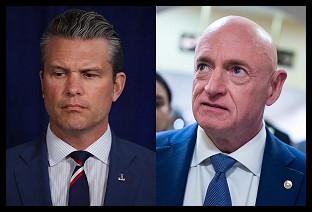 Court Blocks Hegseth Censure of Sen. Mark Kelly
Court Blocks Hegseth Censure of Sen. Mark Kelly Harpy Tantrums, Legal Losses, Election Fails, Retreating ICE and Other Hopeful Signs: 'BradCast' 2/12/26
Harpy Tantrums, Legal Losses, Election Fails, Retreating ICE and Other Hopeful Signs: 'BradCast' 2/12/26 'Green News Report' 2/12/26
'Green News Report' 2/12/26
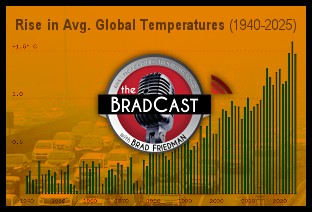 'Let Kids with Asthma Suffer': Trump to Reverse EPA's Landmark 'Endangerment Finding': 'BradCast' 2/11/26
'Let Kids with Asthma Suffer': Trump to Reverse EPA's Landmark 'Endangerment Finding': 'BradCast' 2/11/26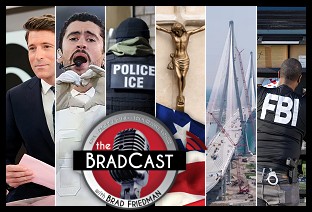 Trump's Presidency Now About Little More Than Racism, Corruption, Culture War Nonsense: 'BradCast' 2/10/26
Trump's Presidency Now About Little More Than Racism, Corruption, Culture War Nonsense: 'BradCast' 2/10/26 'Green News Report' 2/10/26
'Green News Report' 2/10/26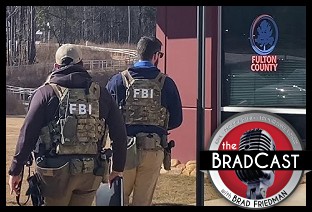 About Trump's FBI Raid of the Fulton County, GA Elections Warehouse: 'BradCast' 2/9/26
About Trump's FBI Raid of the Fulton County, GA Elections Warehouse: 'BradCast' 2/9/26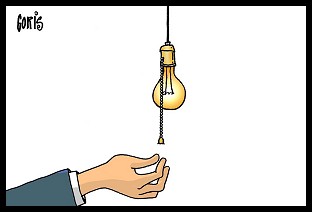 Sunday 'Dead in Darkness' Toons
Sunday 'Dead in Darkness' Toons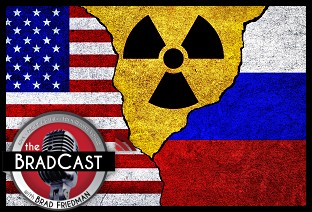 'New START' Treaty Allowed to End Amid New World Disorder: 'BradCast' 2/5/26
'New START' Treaty Allowed to End Amid New World Disorder: 'BradCast' 2/5/26 'Green News Report' 2/5/26
'Green News Report' 2/5/26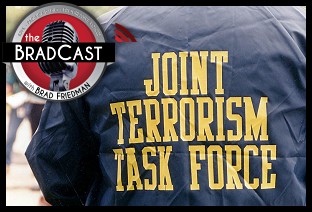 Trump Turns 'War on Terror' Tools Against Domestic Political Foes: 'BradCast' 2/4/26
Trump Turns 'War on Terror' Tools Against Domestic Political Foes: 'BradCast' 2/4/26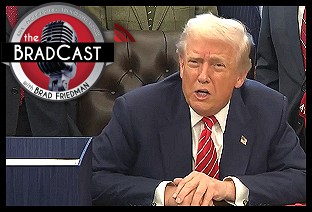 Losing Legally and Politically, Trump Threatens to 'Nationalize' Elections: 'BradCast' 2/3/26
Losing Legally and Politically, Trump Threatens to 'Nationalize' Elections: 'BradCast' 2/3/26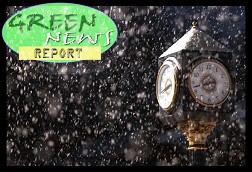 'Green News Report' 2/3/26
'Green News Report' 2/3/26 Bad and Good Bunnies, and an Electoral Shock in Deep 'Red' TX: 'BradCast' 2/2/26
Bad and Good Bunnies, and an Electoral Shock in Deep 'Red' TX: 'BradCast' 2/2/26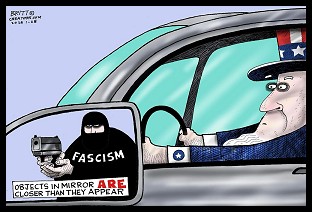 Sunday 'Mirror, Mirror' Toons
Sunday 'Mirror, Mirror' Toons 'Green News Report' 1/29/26
'Green News Report' 1/29/26 It's About Elections and the Windmills of His Mind: 'BradCast' 1/29/26
It's About Elections and the Windmills of His Mind: 'BradCast' 1/29/26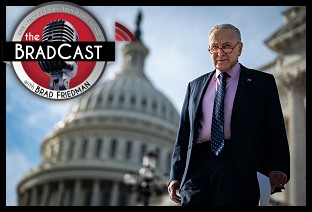 Govt Shutdown Over ICE Funding Near Certain This Weekend: 'BradCast' 1/28/26
Govt Shutdown Over ICE Funding Near Certain This Weekend: 'BradCast' 1/28/26 Trump Blinks, Bovino Out, MN Op Falters, Persists as Midterms Loom: 'BradCast' 1/27
Trump Blinks, Bovino Out, MN Op Falters, Persists as Midterms Loom: 'BradCast' 1/27  The ICE Murder of ICU Nurse Alex Pretti and the Heroes of Mpls: 'BradCast' 1/26/26
The ICE Murder of ICU Nurse Alex Pretti and the Heroes of Mpls: 'BradCast' 1/26/26  The BRAD BLOG: 22 Years and Still Counting
The BRAD BLOG: 22 Years and Still Counting Mr. Smith Testifies (Publicly) in Washington: 'BradCast' 1/22/26
Mr. Smith Testifies (Publicly) in Washington: 'BradCast' 1/22/26 World Turning Against Self-Destructing U.S. Under Trump: 'BradCast' 1/21/26
World Turning Against Self-Destructing U.S. Under Trump: 'BradCast' 1/21/26 Trump Waste, Fraud, Abuse on Voting, at DOJ, by DOGE: 'BradCast' 1/20/26
Trump Waste, Fraud, Abuse on Voting, at DOJ, by DOGE: 'BradCast' 1/20/26
 VA GOP VOTER REG FRAUDSTER OFF HOOK
VA GOP VOTER REG FRAUDSTER OFF HOOK Criminal GOP Voter Registration Fraud Probe Expanding in VA
Criminal GOP Voter Registration Fraud Probe Expanding in VA DOJ PROBE SOUGHT AFTER VA ARREST
DOJ PROBE SOUGHT AFTER VA ARREST Arrest in VA: GOP Voter Reg Scandal Widens
Arrest in VA: GOP Voter Reg Scandal Widens ALL TOGETHER: ROVE, SPROUL, KOCHS, RNC
ALL TOGETHER: ROVE, SPROUL, KOCHS, RNC LATimes: RNC's 'Fired' Sproul Working for Repubs in 'as Many as 30 States'
LATimes: RNC's 'Fired' Sproul Working for Repubs in 'as Many as 30 States' 'Fired' Sproul Group 'Cloned', Still Working for Republicans in At Least 10 States
'Fired' Sproul Group 'Cloned', Still Working for Republicans in At Least 10 States FINALLY: FOX ON GOP REG FRAUD SCANDAL
FINALLY: FOX ON GOP REG FRAUD SCANDAL COLORADO FOLLOWS FLORIDA WITH GOP CRIMINAL INVESTIGATION
COLORADO FOLLOWS FLORIDA WITH GOP CRIMINAL INVESTIGATION CRIMINAL PROBE LAUNCHED INTO GOP VOTER REGISTRATION FRAUD SCANDAL IN FL
CRIMINAL PROBE LAUNCHED INTO GOP VOTER REGISTRATION FRAUD SCANDAL IN FL Brad Breaks PA Photo ID & GOP Registration Fraud Scandal News on Hartmann TV
Brad Breaks PA Photo ID & GOP Registration Fraud Scandal News on Hartmann TV  CAUGHT ON TAPE: COORDINATED NATIONWIDE GOP VOTER REG SCAM
CAUGHT ON TAPE: COORDINATED NATIONWIDE GOP VOTER REG SCAM CRIMINAL ELECTION FRAUD COMPLAINT FILED AGAINST GOP 'FRAUD' FIRM
CRIMINAL ELECTION FRAUD COMPLAINT FILED AGAINST GOP 'FRAUD' FIRM RICK SCOTT GETS ROLLED IN GOP REGISTRATION FRAUD SCANDAL
RICK SCOTT GETS ROLLED IN GOP REGISTRATION FRAUD SCANDAL VIDEO: Brad Breaks GOP Reg Fraud Scandal on Hartmann TV
VIDEO: Brad Breaks GOP Reg Fraud Scandal on Hartmann TV RNC FIRES NATIONAL VOTER REGISTRATION FIRM FOR FRAUD
RNC FIRES NATIONAL VOTER REGISTRATION FIRM FOR FRAUD EXCLUSIVE: Intvw w/ FL Official Who First Discovered GOP Reg Fraud
EXCLUSIVE: Intvw w/ FL Official Who First Discovered GOP Reg Fraud GOP REGISTRATION FRAUD FOUND IN FL
GOP REGISTRATION FRAUD FOUND IN FL

































